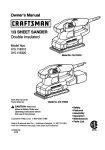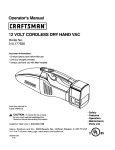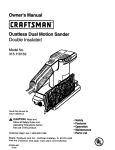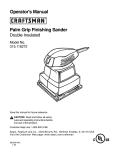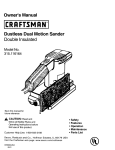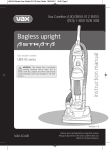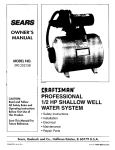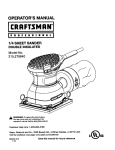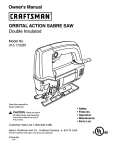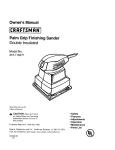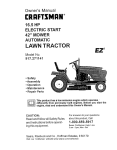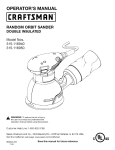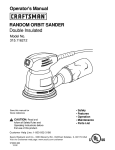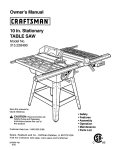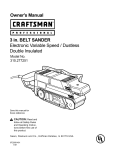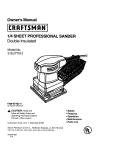Download Craftsman 315.116321 Owner`s manual
Transcript
Owner's Manual II:RRFTSMFIN I 113 SHEET SANDER Double Insulated Model Nos. 315.116311 315.116321 Model No. 315.116311 Save this manual future reference _, for Model No. 315.116321 CAUTION: Read and follow all Safety Rules and Operating Instructions before first use of this product. Customer Help Line: • • • • 1-800-932-3188 Sears Roebuck and Co., Hoffman Estates, IL 60179 visit the Craftsman web page: www.sears.com/craftsman 972000-853 6-01 • Safety • Features Assembly Operation Maintenance Parts List USA US TABLE OF CONTENTS • General Safety Rules ................................................................................................................................................. 2-3 • Specific Safety Rules/Symbols 3-5 • Features ..................................................................................................................................................................... 5-6 • Assembly .................................................................................................................................................................... 7-9 • Operation .................................................................................................................................................................. • Maintenance ................................................................................................................................................................ 11 • Accessories ................................................................................................................................................................. 11 • Exploded View And Repair Parts List .................................................................................................................... 14-15 • Parts Ordering / Service .............................................................................................................................................. .................................................................................................................................. WARNING: Read and understand all instructions. Failure to follow all instructions listed below, may result in.electric serious personal injury. SAVE THESE • • Work Area • Do not operate power tools in explosive atmospheres, such as in the presence of • flammable liquids, gases, or dust. Power tools create sparks which may ignite the dust or fumes. • Keep bystanders, children, and visitors away while operating a power tool. Distractions can cause you to lose control. Electrical • • Avoid body contact with grounded surfaces such as pipes, radiators, ranges and refrigerators. There is an increased risk of electric shock if your body is grounded. When operating a power tool outside, use an outdoor extension cord marked "W-A" or "W". Personal • Safety Stay alert, watch what you are doing and use common sense when operating a power tool. Do not use tool while tired or under the influence of drugs, Double insulated tools are equipped with a polarized plug (one blade is wider than the polarized outlet. Do not change the plug in any way. Double insulation [] eliminates the need for the three wire grounded power cord and grounded power supply system. Do not abuse the cord. Never use the cord to These cords are rated for outdoor use and reduce the risk of electric shock. Safety other.) This plug will fit in a polarized outlet only one way. If the plug does not fit fully in the outlet, reverse the plug. If it still does not fit, contact a qualified electrician to install a power tools to rain or wet condi- carry the tools or pull the plug from an outlet. Keep cord away from heat, oil, sharp edges or moving parts. Replace damaged cords immediately. Damaged cords increase the risk of electric shock. INSTRUCTIONS Keep your work area clean and well lit. Cluttered benches and dark areas invite accidents. 16 tions. Water entering a power tool will increase the risk of electric shock. shock, fire and/or • Don't expose 9-10 alcohol, or medication. moment of inattention while operating may result in serious personal injury. • A power tools Dress properly. Do not wear loose clothing or jewelry. Contain long hair. Keep your hair, clothing, and gloves away from moving parts. Loose clothes, jewelry, or long hair can be caught in moving parts. • Avoid accidental starting. Be sure switch is off before plugging in. Carrying tools with your finger on the switch or plugging in tools that have the switch on invites accidents. • Remove adjusting keys or wrenches Store before idle tools out of reach of children and turning the tool on. A wrench or a key that is left attached to a rotating part of the tool may result in other untrained persons. Tools are dangerous in the hands of untrained users. personal injury. Maintain • Do not overreach. Keep proper footing and balance at all times. Proper footing and balance enables better control of the tool in unexpected situations. sharp and clean. Properly maintained tools, with sharp cutting edges are less likely to bind and are easier to control. • Use safety equipment. Always wear eye protection. Dust mask, nonskid safety shoes, hard hat, or hearing protection must be used for appropriate • • application. The correct tool will do the job better and safer at the rate for which it is designed. • Disconnect the plug from the power source before making any adjustments, changing accessories, or storing the tool. Such preventive safety measures tool accidentally. reduce risk of starting the of moving that are recommended by the manufacturer for your model. Accessories that may be suitable for one tool, may become hazardous when used on another tool. SERVICE • Tool service must be performed only by qualified repair personnel. Service or maintenance performed by unqualified personnel could result in a risk of injury. Do not use tool if switch does not turn it on or off. Any tool that cannot be controlled with the switch is dangerous and must be repaired. • Use only accessories Use clamps or other practical way to secure and support the workpiece to a stable platform. Holding the work by hand or against your body is unstable and may lead to loss of control. tool for your or binding damaged, have the tool serviced before using. Many accidents are caused by poorly maintained tools. conditions. Do not force tool. Use the correct Check for misalignment tools parts, breakage of parts, and any other condition that may affect the tools operation. If Tool Use and Care • tools with care. Keep cutting • When servicing a tool, use only identical replacement Maintenance parts. Follow instructions in section of this manual. Use of unauthorized parts or failure to follow Mainte- nance Instructions may create a risk of electric shock or injury. Specific • Safety • Rules for Sanders Never use this or any power sander for wet sure to use one heavy enough to carry the current your product will draw. A wire gage size (A.W.G.) of at least 16 is recommended for an extension cord 100 feet or less in sanding or liquid polishing. Failure to comply will increase the risk of electrical shock. Additional • Rules for Safe Operation Know your power tool. Read operator's manual carefully. Learn its applications and limitations, as well as the specific potential length. A cord exceeding 100 feet is not recommended, if in doubt, use the next heavier gage. The smaller the gage number, the heavier the cord. An undersized cord will hazards related to this tool. Following this rule will reduce the risk of electric shock, fire, or cause a drop in line voltage power and overheating. serious injury. • Always wear safety glasses. Everyday eyeglasses have only impact-resistant lenses; they are NOT safety glasses. Following this rule will reduce the risk of personal injury. • Protect your lungs. Wear a face or dust mask if the operation is dusty. Following this rule will reduce the risk of personal injury. • Protect your hearing. Wear hearing protection during extended periods of operation. Following this rule will reduce • Inspect tool the risk of personal cords periodically • injury. Drugs, alcohol, medication. Do not operate tool while under the influence of drugs, alcohol, or any medication. Following this rule will reduce the risk of electric shock, fire, or personal injury. • Save these instructions. Refer tothem frequently and use them to instruct others who may use this tool. If you loan someone this tool, loan them these instructions also. This will reduce the risk of fire, shock, and injury. A WARNING: Some dust created by power sanding, sawing, grinding, drilling, and other construction activities contains chemicals known Check damaged parts. Before further use of the tool, a guard or other part that is damaged should be carefully checked to determine that to cause cancer, it will operate properly and perform its intended function. Check for alignment of moving parts, binding of moving parts, breakage of parts, mounting, and any other conditions that may affect its operation. A guard or other part • lead from lead-based shock, fire, or serious injury. Don't abuse cord. Never carry the tool by the cord or yank it to disconnect it from the receptacle. Keep cord away from heat, oil, and sharp edges. Following this rule will reduce the risk of electric shock or fire. in loss of • Factory Service that is damaged should be properly repaired or replaced by an authorized service center. Following this rule will reduce the risk of electric resulting Inspect for and remove all nails from lumber before sanding. Following this rule will reduce the risk of personal injury, Organization. Constantly stay aware of cord location. Following this rule will reduce the risk of electric shock or fire. • • and, if dam- aged, have repaired at your nearest Service Center or other Authorized Make sure your extension cord is in good condition. When using an extension cord, be birth defects or other reproductive harm. Some examples chemicals are: • crystalline and other • arsenic treated silica paints, from bricks masonry of these products, and chromium lumber. and cement and from chemically- Your risk from these exposures varies, depending on how often you do this type of work. To reduce your exposure to these chemicals: work in a well ventilated area, and work with approved safety equipment, such as those dust masks that are specially designed to filter out microscopic particles. SYMBOLS SYMBOL NAME DESIGNATION/EXPLANATION V Volts Voltage A Amperes Current Hz Hertz Frequency (cycles per second) W Watt Power min Minutes Time Alternating Current Type or a characteristic of current No Load Speed Rotational speed, at no load Class II Construction Designates Double Insulated Construction tools no .../min ,_1 k. Revolutions or Reciprocation Per Minute Safety Alert Symbol Revolutions, strokes, surface speed, orbits etc. per minute Indicates danger, warning or caution. It means attention!!! Your safety is involved. DEFINITIONS A) DANGER: Failure to obey a safety warning will result in serious injury to yourself or to others. Always follow the safety precautions to reduce the risk of fire, electric shock and personal injury. B) WARNING: Failure to obey a safety warning can result in serious injury to yourself or to others. Always follow the safety precautions to reduce the risk of fire, electric shock and personal injury. c) CAUTION: Failure to obey a safety warning may result in property damage or personal injury to yourself or to others. Always follow the safety precautions to reduce the risk of fire, electric shock and personal injury. D) NOTE: Advises you of information or instructions vital to the operation or maintenance of the equipment. KNOW YOUR SANDER ELECTRICAL See Figure 1. CONNECTION Your sander has a precision built electric motor. It should be connected to a power supply that is 120 volts, 60 Hz, AC only (normal household current). Do not operate this tool on direct current (DC). A substantial voltage drop will cause a loss of power and the motor will overheat. If your tool does not operate when plugged into an outlet, double-check the power supply. Before attempting to use your sander, familiarize yourself with all operating features and safety requirements. Your sander is suitable for sanding with coarse, medium, and fine grit sandpaper. It will produce a fine scratch free finish when used to sand with the grain on wood surfaces. It has also been designed so that sanding flush to corners is possible. PRODUCT SPECIFICATIONS APPLICATIONS No Load Speed (Use only for the purposes listed below) Rating • Sanding on wood surfaces. • Removing rust from and sanding steel surfaces. Input Model No. 315.116311 Model No. 315.116321 SWITCH 1.8 Amperes 2.0 Amperes Orbit Diameter This tool is equipped with a slide switch located on the rear handle of your sander. To turn sander ON, slide the switch forward as shown in Figure 1. Slide the switch back to turn your sander OFF. Be sure sander switch is in OFF position before connecting to power supply source. DUSTLESS 12,000 opm 120Volts, 60 Hz, AC only FEATURE (Model No. 315.116321 1/16 in. Size of Paper 1/3 sheet Paper Type ) A dust bag assembly and a vacuum hose adapter is included with your sander. Each provide a dust collection system for your sander. Non-Adhesive Sandpaper Adhesive Sandpaper Dustless Model No. 315.116321 Only Vacuum Hose Adaptor Model No. 315.116321 Only _k WARNING: Do not allow familiarity with your sander to make you careless. Remember that a careless fraction of a second is sufficient to inflict severe injury. TO TURN SANDERON SWITCH SWITCH REAR HANDLE TO TURN SANDEROFF HANDLE DUSTBAGASSEMBLY (MODELNO. 315.116321) VACUUMHOSEADAPTER (MODELNO. 315.116321) PLATEN PAPERCLAMP LEVER 6 Fig. 1 _IL WARNING: Your sander should never be connected to power supply when you are assembling parts, making adjustments, assembling or replacing sandpaper, cleaning, or when not in use. Disconnecting your sander will prevent accidental starting that could cause serious personal injury. INSTALLING SANDPAPER See Figures 2 and 3. The cushion on your sander gives you the option of using either non-adhesive sandpaper that clamps to the platen; or adhesive backed sandpaper with pressure sensitive adhesive backing that sticks to the cushion. INSTALLING NON-ADHESIVE • Lift up on lever on the left side of sander and lock into slot on platen. Apply downward pressure to conform sandpaper to platen. • Wrap sandpaper around cushion and insert loose end of sandpaper under the rear paper clamp. Fit sandpaper against cushion as tight as possible. • Lift up on lever located on right side of sander and lock into slot in platen. INSTALLING • _l, SANDPAPER See Figure 2. Inspect sandpaper before installing. Do not use if broken or defective. • ,_L SANDPAPER Unplug your sander. WARNING: Failure to unplug your sander could result in accidental starting causing possible serious personal injury. • If replacing adhesive sandpaper, remove old sandpaper by peeling it off cushion. If removing nonadhesive sandpaper, release paper clamp by lifting up on each lever, then remove sandpaper. • Place levers back in locked position. Note: Always check to make sure levers are in locked position before turning sander on. • Carefully peel adhesive backing from new 1/3 sheet sandpaper. Unplug your sander. WARNING: Failure to unplug your sander could result in accidental starting causing possible serious personal injury. ADHESIVE See Figure 3. • Position sandpaper, making sure front edge of sandpaper is aligned with front edge of the cushion, then carefully press sticky side of sandpaper on cushion. Note: Sandpaper must be aligned with the front edge of the cushion for proper functioning of the flush sanding feature. Note: It is recommended that you clean cushion occasionally by brushing lightly with a small brush. Dust build-up on cushion could cause sandpaper to not stick properly. SLOT PAPERCLAMP IN UNLOCKED POSITION NON-ADHESIVE SANDPAPER LEVER Fig. 2 Note: If your sander is Model No. 315.116321, removing the dust bag assembly will make installing non-adhesive sandpaper easier. Always remember to replace the dust bag assembly before beginning operation. • If replacing sandpaper, remove old sandpaper. To remove sandpaper, a lever is located on each side of your sander. Release paper clamps securing sandpaper by lifting up on each lever and disengaging from slot in platen. • Insert end of new 1/3 sheet sandpaper approximately 1/2 inch under the front paper clamp. ADHESIVE SANDPAPER Fig. 3 ATTACHING DUST BAG ASSEMBLY TO REMOVE (Model No. 315.116321) See Figure 4. • DUSTBAG ADAPTER EXH _, • _, DUST BAG Unplug your sander. ,_, MODEL NO. 315.116321 AND EMPTY See Figure 5. WARNING: Failure to unplug your sander could result in accidental starting causing possible serious personal injury. • Remove dust bag assembly from sander. To remove, grasp adapter and pull straight out. • Then remove dust bag from adapter as shown in figure 5. • Shake dust bag to empty. • Place dust bag back on adapter. • Attach dust bag assembly back on sander. Fig. 4 WARNING: To prevent the possibility of sanding dust or foreign objects being thrown into your face or eyes, never attempt to use your sander without the dust bag assembly properly installed. Sanding dust or foreign objects being thrown into your face could result in possible serious personal injury. DUSTBAG Unplug your sander. DUSTBAG ADAPTER WARNING: Failure to unplug your sander could result in accidental starting causing possible serious personal injury. • Insert dust bag adapter into dust exhaust hole. See Figure 4. • Push in on adapter until raised notches on top and bottom of adapter snap into grooves in dust exhaust hole. • Your sander is now ready for operation. Note: For more efficient operation, empty dust bag when no more than half full. This will permit the air to flow through the bag better. Always empty and clean dust bag thoroughly when finished sanding operation and before storing sander. DUST EXHAUSTHOLE MODEL NO. 315.116321 8 Fig. 5 ATTACHING VACUUM HOSE ADAPTER A vacuum hose adapter is packed with sander Model No. 315.116321. This adapter easily attaches to your sander if you decide to connect your sander to a vacuum. _1, WARNING: Always wear safety goggles or safety glasses with side shields when operating your sander. Failure to do so could result in foreign objects being thrown into your eyes, resulting in possible serious injury. If the sanding operation is dusty, also wear a face or dust mask. • PREPARING (Model No. 315.116321) See Figure 6. _lh Unplug your sander. WARNING: Failure to unplug your sander could result in accidental starting causing possible serious personal injury. ,_ CAUTION: air vents. FOR OPERATION Be careful not to let your hand cover the SANDING TO ATTACH: Clamp or otherwise secure the work to prevent it from moving under your sander. • Remove dust bag assembly from sander. To remove, grasp adapter and pull straight out. • Insert vacuum hose adapter into dust exhaust hole. • Push in on adapter until raised notch on top and bottom of adapter snap into groove in dust exhaust hole. H • Snugly attach vacuum hose adapter to vacuum hose. • Connect vacuum hose to cleaner. Hold your sander in front and away from you, keeping it clear of the workpiece. Start your sander by sliding the switch button to the on position and letting the motor build to its maximum speed. Gradually lower your sander on the work with a slight forward movement. See Figure 7. Move it slowly using forward and backward strokes. VACUUMHOSE ADAPTER WARNING: Unsecured work could be thrown towards the operator causing injury. RAISED NOTCH EXHAUSTHOLE MODEL NO. 315.116321 Fig. 6 Fig. 7 DO not force. The weight of the unit supplies adequate pressure, so let the sandpaper and sander do the work. Applying additional pressure only slows the motor, rapidly wears sandpaper and greatly reduces sander speed. Excessive pressure will overload the motor causing possible damage from motor overheating and can result in inferior work. Any finish or resin on wood may soften from the frictional heat. Do not allow sanding on one spot too long as the sander's rapid action may remove too much material, making the surface uneven. 9 SANDPAPER SELECTION Flush sanding can be performed with your sander. See Figure 9. Every side except the rear of your sander allows flush sanding in corners. Always remove sander from workpiece before turning your sander off. Selecting the correct size grit and type sandpaPer is an extremely important step in achieving a high quality sanded finish. Aluminum oxide, silicon carbide, and other synthetic abrasives are best for power sanding. Natural abrasives, such as flint and garnet are too soft for economical use in power sanding. In general, coarse grit will remove the most material and finer grit will produce the best finish in all sanding operations. The condition of the su#ace to be sanded will determine which grit will do the job. If the surface is rough, start with a coarse grit and sand until the surface is uniform. Medium grit may then be used to remove scratches left by the coarser grit and finer grit used for finishing of the surface. Always continue sanding with each grit until surface is uniform. Note: Do not use sander without sandpaper. Doing so will damage the cushion. & WARNING: Do not wear loose clothing or jewelry when operating sander. They could get caught in moving parts causing serious injury. Keep head away from sander and sanding area. Hair could be drawn into sander causing serious injury. ORBITAL Fig. 9 REMOVING MOTION See Figure 8. SANDPAPER BEFORE STORAGE Do not store your sander with pressure sensitive adhesive sandpaper installed. Heat generated from sanding causes the pressure sensitive adhesive to flow and form a tight bond between the cushion and sandpaper. Orbital motion is ideal for fast cutting action when removing old finishes, smoothing rough wood, cutting stock down to required dimensions, or for finishing surfaces to be painted. As shown in figure 8, the sandpaper moves in tiny circles at a very high speed, allowing the sander to move easily. Removing the sandpaper soon after you have finished a sanding operation avoids letting the adhesive set up. If the sandpaper is left on the cushion for an extended period of time after use, the adhesive will set up and cause the sandpaper to become difficult to remove. It may also tear when removing. When this situation occurs, it becomes difficult to clean the cushion for the next piece of sandpaper. Note: If you forget to remove the sandpaper after a sanding operation, sand for a few minutes to soften the adhesive backing before attempting to remove sandpaper. ORBITALMOTION Fig. 8 10 _k WARNING: When servicing use only identical Craftsman replacement parts. Use of any other parts may create a hazard or cause product damage. GENERAL EXTENSION The use of any extension cord will cause some loss of power. To keep the loss to a minimum and to prevent tool from overheating, use an extension cord that is heavy enough to carry the current the tool will draw. All parts represent an important part of the double insulation system and should be serviced only by a qualified Sears service technician. A wire gage size (A.W.G.) of at least 16 is recommended for an extension cord 100 feet or less in length. When working outdoors, use an extension cord that is suitable for outdoor use. The cord's jacket will be marked WA. Avoid using solvents when cleaning plastic parts. Most plastics are susceptible to damage from various types of commercial solvents and may be damaged by their use. Use clean cloths to remove dirt, carbon dust, etc. ,_ CORDS WARNING: Do not at any time let brake fluids, gasoline, petroleum-based products, penetrating oils, etc. come in contact with plastic parts. They contain chemicals that can damage, weaken, or destroy plastic. It has been found that electric tools are subject to accelerated wear and possible premature failure when they are used on fiberglass boats, sports cars, wallboard, spackling compounds, or plaster. The chips and grindings from these materials are highly abrasive to electric tool parts such as bearings, brushes, commutators, etc. Consequently, it is not recommended that this tool be used for extended work on any fiberglass material, wallboard, spackling compounds, or plaster. During any use on these materials it is extremely important that the tool is cleaned frequently by blowing with an air jet. ,_ CAUTION: Keep extension cords away from the sanding area and position the cord so that it will not get caught on lumber, tools, etc., during sanding. ,_ WARNING: Check extension cords before each use. If damaged replace immediately. Never use tool with a damaged cord since touching the damaged area could cause electrical shock resulting in serious injury. Extension cords suitable for use with your sander are available at your nearest Sears Retail Store. ,_ WARNING: Always wear safety goggles or safety glasses with side shields during power tool operation or when blowing dust. If operation is dusty, also wear a dust mask. LUBRICATION All of the bearings in this tool are lubricated with a sufficient amount of high grade lubricant for the life of the unit under normal operating conditions. Therefore, no further lubrication is required. The following recommended accessories are currently available at Sears Retail Stores. ALUMINUM OXIDE SHEETS NON LOADING ALUMINUM OXIDE (3-2/3 in. x 9 in.) ADHESIVE BACKED (3-2/3 in. x 7-1/8 in.) Fine Extra Fine Fine Medium Medium Coarse Coarse _IL WARNING: ,_ The use of attachments or accessories not listed might be hazardous. WARNING: The operation of any sander can result in foreign objects being thrown into your eyes, which can result in severe eye damage. Before beginning power tool operation, always wear safety goggles or safety glasses with side shields and a full face shield when needed. We recommend Wide Vision Safety Mask for use over eyeglasses or star_dard safety glasses with side shields, available at Sears Retail Stores. 11 WARRANTY FULL ONE YEAR WARRANTY ON CRAFTSMAN SANDER MODEL NO. 315.116311 If this CRRFTJ;MRN Sander fails to give complete satisfaction within one year from the date of purchase, RETURN IT TO THE NEAREST SEARS STORE IN THE UNITED STATES, and Sears will replace it, free of charge. If this CRRFTSMRN Sander is used for commercial or rental purposes, this warranty applies for only 90 days from the date of purchase. This warranty gives you specific legal rights, and you may also have other rights which vary from state to state. Sears, Roebuck and Co., Dept. 817WA, Hoffman Estates, IL 60179 WARRANTY FULL ONE YEAR WARRANTY ON CRAFTSMAN SANDER MODEL NO. 315.116321 If this/RRFTSMAN Sander fails to give complete satisfaction within one year from the date of purchase, RETURN IT TO THE NEAREST SEARS STORE IN THE UNITED STATES, and Sears will repair it, free of charge. If this [RRFT.I;MRN Sander is used for commercial or rental purposes, this warranty applies for only 90 days from the date of purchase. This warranty gives you specific legal rights, and you may also have other rights which vary from state to state. Sears, Roebuck and Co., Dept. 817WA, Hoffman Estates, IL 60179 SAVETHESEINSTRUCTIONS NOTES: 12 NOTES: 13 CRAFTSMAN SANDER - MODEL NOS. 315.116311 AND 315.116321 SEE NOTE "A" PAGE 15 1 '2 I I 3 4 12 6 10 I 7 4 '=' 8 14 CRAFTSMAN SANDER - MODEL NOS. 315.116311 AND 315.116321 I The model number will be found on a plate attached to the motor housing. Nways mention the model number in all correspondence regarding your SANDER or when ordering repair parts. SEE BACK PAGE FOR PARTS ORDERING J INSTRUCTIONS PARTS LIST Key No. Part Number Description 1 982588-001 982590-001 Data Plate (Model No. 315.116311) ........................ Data Plate (Model No. 315.116321 ) ........................ 1 1 2 977308-001 977272-001 Logo Plate (Model No, 315.116311) Logo Plate (Model No. 315.116321) ....................... ....................... 1 1 3 977265-001 Dust Shield (Model No. 315,116321 ) ...................... 1 4 977266-001 Paper Clamp ............................................................ 2 5 623019-004 Rubber Plug ............................................................. 1 6 977267-001 Platen ....................................................................... 1 7 617966-028 Screw (#8-10 x 1/2 in. Pan Hd.) .............................. 4 8 977268-001 977268-002 Cushion (Model No. 315.116321) Cushion (Model No. 315.116311) 1 1 9 *** 10 976967-002 Vacuum Hose Adapter (Model No. 315.116321) .... 1 11 989919-005 Ball Bearing ............................................................. 12 977270-001 Dust Bag Assembly (Model No. 315.116321) 972000-853 Owner's Manual Quan. ........................... ........................... Sandpaper 1 ......... 1 NOTE: "A"- The assembly shown represents an important part of the Double Insulated System. To avoid the possibility of alteration or damage to the system, service should be performed by your nearest Sears Repair Center. Contact your nearest Sears Retail Store for Service Center information. * Standard Hardware Item - May Be Purchased Locally *** Complete Assortment Available At Your Nearest Sears Retail Store 15 Get it fixed, at your home or ours! For repair of major brand appliances in your own home... no matter who made it, no matter who sold ifl 1-800-4-MY-HOME sMAnytime, day or night (1-800-469-4663) www.sears.com To bring in products such as vacuums, lawn equipment and electronics for repair, call for the location of your nearest Sears Parts & Repair Center. 1-800-488-1222 Anytime, day or night www.sears.com For the replacement parts, accessories and owner's manuals that you need to do-it-yourself, call Sears PartsDirect sM! 1-800-366-PART 6 a.m. - 11 p.m. CST, (1-800-366-7278) 7 days a week www.sears.com/partsdirect To purchase or inquire about a Sears Service Agreement: 1-800-827-6655 7 a.m. - 5 p.m. CST, Mon.- Para pedir servicio de reparaci6n a domicilio, y para ordenar piezas con entrega a domicilio: 1-888-SU-HOGAR s_ Sat. Au Canada pour service en fran_ais: 1-877-LE-FOYER s_ (1-877-533-6937) (1-888-784°6427) I HomeCentral SEARS _ 1 ® Registered ® Sears. Roebuck and Co. ® Mama Trademark Registrada / TM / T_ Marca Trademark de F&'brica of Sears. de Sears, Roebuck Roebuck and and Co Co.
















